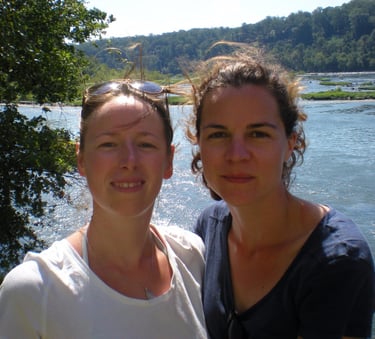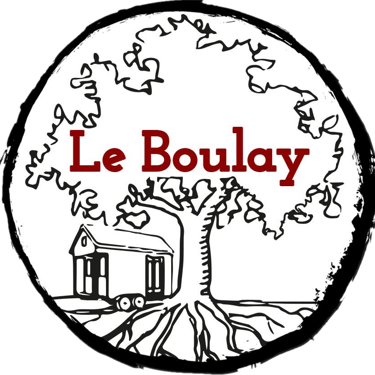Inspiration


"What motivates us are the people we meet, those who are already far ahead of us on certain things, who inspire us, help us and advise us. And those who are just starting out, who want to make this world live a little longer, who want to change their habits and that seems overwhelming but is already so normal for others. Well, we want to show you what all your efforts will lead to in a few years' time, and just how much everything you do will count."
Magali and Catherine
In the Tiny House
Disposables
The solid body soaps, made in blocks by artisans during our trips, are cut into small blocks to suit the number of people and the length of your stay.
Sponges are vegetal, washing-up liquid is bought in bulk, as are Coslys organic shampoos.
Household products (black soap, all-purpose soap, disinfectant spray, vinegar) are bought in bulk and have a low environmental impact or are biodegradable. We have reusable cloths (currently microfiber) for the various surfaces we clean.
Recycled toilet paper, bamboo tissues and kitchen towels from Who Gives a Crap are not local, but 50% of profits are donated to help provide access to clean water and toilets for all. They're not wrapped in plastic, and we use the cardboard in the garden, and the packaging to light our wood stove.
Local and/or organic food production
Organic topette coffee from Peru purchased in 5kg buckets from l'Echelle à café (Trémentines, 49), we grind the coffee before each reservation.
Organic tea and herbal teas are loose or compostable bags, from different brands depending on the gifts we receive (thank you!!).
Organic apple juice from La ferme aux 5 chemins (a pedagogical farm for preserving special breeds).
Pasta and rice are available: organic bulk rice and organic pasta from Ferme des Patis.
Dairy products, meat and vegetables come from organic farms within a 15km radius.
Fruit, eggs, honey and seasonal vegetables come from our own production.
The bottles of wine we sell with your aperitif trays and ready-made meals come from the various discoveries, meetings and vineyard visits we make throughout the year. All these winemakers are passionate about their work, share our values and understand the impact of nature on us and vice versa.
Homemade picnics are supplied in reused (and reusable) jars and reused bakery bags.
The dry toilet
After several trials (ESAT for sawdust and homemade wood shavings), the shavings and sawdust were generously donated to us by either Baluchon (manufacturer of the Tiny Kiwi) or Drugeot Manufacture, a 15-minute drive away, manufacturer of solid French oak furniture.
Linen
Bed linen is made from linen and the towels are made from cotton, both made in Portugal.
There's no tumble dryer, so linen dries outside all year round, or by the wood-burning stove.
And the rest
The decorations, tea towels and some of the crockery come from New Zealand, gifts from Mum Liz!
All the other decorations, knick-knacks, books, games and bikes, garden furniture, kitchen utensils, crockery, vacuum cleaner, etc. come from second-hand stores, garage sales, gifts from friends and family, salvage, etc.
Financial help
We received support from Adème for the purchase of the following equipment:
Composting area for food waste and dry toilet.
Wood chipper to not burn small pruning branches and thus create clean, natural paths all around the property.
Outdoor sunshade to manage the high temperature in summer, the trees shade the tiny house from 2pm.
Solar LED lights to find your way, illuminating only the ground, and activated only if late arrivals are expected.
The GreenGo platform
We've chosen to use only one booking platform in addition to our website, GreenGo. Here are a few reasons why:
GreenGo is an eco-responsible accommodation platform.
GreenGo hosts are selected and evaluated on over 100 ecological criteria.
GreenGo is a French company, with taxes paid in France.
You can compare the time, price and carbon impact for any journey and any mode of transport to get to La Tiny Kiwi.
On the farm
Transparency always had a very important place in our lives. It takes a huge amount of time to read labels or search for origins, ingredients or components. Research on websites for how things are made, how animals are fed, or how employees are valued is not something everyone wants to spend time on, but we do. We want to be as transparent as we expect others to be, and try to make it easy to see what we do concretely, one small step at a time.
Everyone starts differently with what is simplest in the moment. For us, it was reusing everything we could. But every single idea we had took forever to become what we dreamt of. Like, we wanted the old windows of the house to become our future greenhouse. It took 3 years, and we stored them in 3 different places by that time, but we finally did it!
We've had to learn how to make things, repair others, and so much more (sometimes it works, and others it doesn't). And we're not yet self-sufficient in the garden, but this is our main objective. Despite the incredible seasons we have every year, we don't change our practices, we don't work the soil, we use animals (when they want to work), we use organic and heritage seeds every year, even if everyone else next door has beautiful vegetables before us from purchased plans. The task is long, and perseverance is the order of the day. But we believe it's worth the challenge and the time.
Each stay in the Tiny Kiwi enables us to do more in Le Boulay. We regenerated our pond to make it more accessible to biodiversity and reoxygenate the water. Every year we can buy new seeds and some plants. We can join labels and networks that provides us trainings and knowledge. We can feed all our animals and build their enclosures and shelters. We get more creative every year so it's just the beginning!
On our website
You might notice we don't have many photos on our website, we keep our design really simple, and we don't send many emails. This is called a sustainable user experience (SUX).
Did you know, that every webpage creates CO2 emissions? So does every email that's sent and stored on the cloud. And every image, video, and gif. Even the different fonts that don't come with all computers take data, which in turn takes energy, emits emissions, and consumes water. So, we try to restrict what we do on our website and on social media to reduce our emissions.
We can still do more, and so can you. Unsubscribe from emails that you always delete. Ensure you only send images and videos when really needed. Only send emails and use the reply to all functionality when you really need to. And keep the photos you store on the cloud to a minimum.
